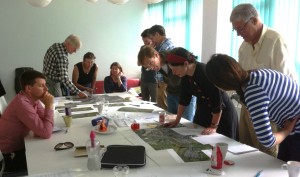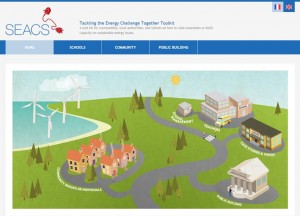Resources
Community Energy Legal Toolkit
Devon County Council has teamed up with Foot Anstey and Climate Positive to prepare a Community Energy Legal Toolkit to help community energy groups understand good practice in developing community energy projects so that their community’s interests are properly protected.
The toolkit presents four flowcharts, each of which describes the process for developing a different community energy project – wind, hydro, rooftop solar PV and ground mount solar PV – from convening an enthusiastic group through to commissioning the scheme. At key stages of the process the flowcharts advise which legal agreements should be agreed by various parties. Templates are provided for these agreements, accessed through hyperlinks in the flowcharts. Download the flowcharts.
Guide to Choosing a Legal Entity
Any community group looking to take forward a renewable energy project will need to give considerable attention to having the right legal status. Unless the group becomes one of a number of possible Incorporated entities, there are a number of fundamental issues that may well arise:
- Access to grants or other sources of funds will be difficult if not impossible
- Few third parties such as property owners and installers will offer or undertake contracts
- Accountability of decisions, especially financial, will be unenforceable
- The laws for raising money by public share subscription are very strict
- Individuals are likely to be at risk of personal financial liability for any problems or failures.
The Partnership has reviewed the wide range of information available online that is designed to help community groups determine which legal entity is suitable for them. As a result of this review the Partnership has collated a short guide that includes links to some of the best further reading, and produced case studies of the decisions taken by three Devon community groups.
Guide to Establishing a Community Group as a Legal Entity
Plymouth Energy Community and PEC Renewables Case Study
South Brent Community Energy Society – Case Study
Transition Town Totnes Legal Structure Case Study
Selecting Roofs for Solar PV Installation

Following a desktop review of tools available to community energy groups to identify local roofs suitable for solar PV, the Partnership decided to test a workshop tool available as part of the Centre for Sustainable Energy’s PlanLoCaL toolkit – ‘Estimating the potential deployment, costs and income for a community-wide solar PV scheme‘.
The PlanLoCal tool provides a step-by-step guide for organising and running the workshop. The activity involves attendees examining large-scale satellite photographs of their neighbourhood to assess what the total solar resource might be if all the suitable roof spaces could be used. Included are three online videos that provide an excellent introduction to solar power, things to consider before starting a solar project, and a showcase of West Oxford Community Energy’s PV scheme.
The outcome of the workshop is a short addendum that the Partnership recommends communities use alongside the PlanLoCal tool. The addendum links to two further documents. The first provides a spreadsheet for evaluating the business case for your community energy solar PV scheme (kindly provided by South Brent Community Energy Society), and the second discusses some of the detailed issues you will need to consider when selecting a roof. A presentation is also available that the workshop organisers can use to introduce the exercise. All of these documents are available for download below:
Addendum to Plan LoCaL Rooftop Solar PV Exercise
Rooftop Solar PV Business Model
Factors for Rooftop Selection for Solar PV Installation
Workshop Presentation – Solar PV Roofs
Identifying Opportunities for Biomass District Heating
The Partnership decided to test two workshop tool available as part of the Centre for Sustainable Energy’s PlanLoCaL toolkit -’Identifying and assessing a potential district heating area using the National Heat Map‘ and ‘Assessing the heat demand of a whole community for biomass district heating potential‘.
The PlanLoCal tools provide step-by-step guides for organising and running two workshops, although we found that it is easy enough to combine both exercises into one workshop as they are very closely related. The first of the exercises identifies local heat demand using the National Heat Map, and the second exercise uses satellite photographs to identify specific buildings that might form part of your district heating network. Included in the PlanLoCal toolkit are three online videos that provide an excellent introduction to biomass, things to consider before starting a biomass district heating project, and a showcase of biomass heating in Sussex and Barnsley.
The outcome of the workshop is a short addendum that the Partnership recommends communities use alongside the PlanLoCal tools, and a presentation the workshop organisers can use to introduce the exercise. All of these documents are available for download below:
Addendum to Plan LoCaL District Heating Exercises
Workshop Presentation – Biomass District Heat Networks
School Curriculum Resources
 FREE energy curriculum-resources to help teachers and school managers raise awareness and take action are available in the SEACS Project Toolkit, funded by the EU and Devon County Council.
FREE energy curriculum-resources to help teachers and school managers raise awareness and take action are available in the SEACS Project Toolkit, funded by the EU and Devon County Council.
There is, for example:
- a self-evaluation matrix to guide you on your energy awareness journey; primary and secondary lesson plans for Design & Technology, French, Science and PSHE
- tips on running a whole-school awareness raising campaign
- guidance for arranging a United Nations style Climate Summit
- templates and guidance to help your school audit and measure its energy consumption
- case studies and videos showing how others have used the tools.
Recent Posts
Community Energy Spring Gathering
Community energy organisations from across Devo...Brexit and Local Supply
The SWDCEP General Forum met on the 20th July i...Woody Energy Crops for Small-Scale District Heating
28th September 2015 This free workshop will foc...The Truth About Energy Subsidies
Fossil-fuel consumption subsidies worldwide amo...Wood Fuel From Hedges – Saturday 14th March 2015
Learn about the opportunities locally for wood ...
| M | T | W | T | F | S | S |
|---|---|---|---|---|---|---|
| « Mar | ||||||
| 1 | 2 | 3 | 4 | 5 | 6 | |
| 7 | 8 | 9 | 10 | 11 | 12 | 13 |
| 14 | 15 | 16 | 17 | 18 | 19 | 20 |
| 21 | 22 | 23 | 24 | 25 | 26 | 27 |
| 28 | 29 | 30 | 31 | |||
